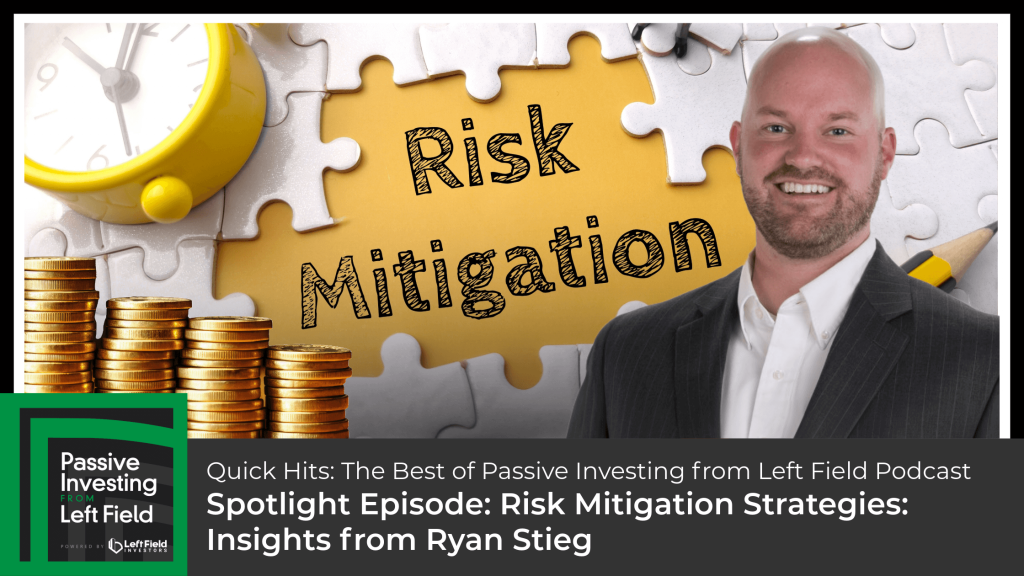Navigating Deals Gone Wrong: Hard Lessons for Passive Investors
Uncover insider perspectives on syndication investing pitfalls from Ryan Stieg, CFO and Co-Founder of the Left Field Investors Community. He joins host, Chad Ackerman, to transparently detail an early high-referral offering that ultimately failed despite initial positives. Ryan reflects on communication gaps, due diligence shortcomings, and the importance of portfolio diversification when assessing setbacks. Read on for a thoughtful exchange on precautions passive investors must consider when evaluating private real estate sponsors.
The Pitfalls of a Referred Opportunity
Ryan Stieg’s real estate syndication journey traces back to a specific investment referred through trusted contacts.
The well-regarded operator offered two structures:
1) Turnkey rental properties fully managed by their team
2) A liquid private debt fund collateralized by their assets
The flexible options and strong background checked key boxes for Ryan’s criteria.
He began regularly contributing capital to the debt fund option. For over a year, the fund performed reliably, delivering consistent interest payments and timely investor liquidity upon redemption requests. Thus, there were no glaring red flags emerging from the tidy operations and communications.
However, following broader market shifts from mid-2022, various concerns crept into view. The frequency of portfolio updates from sponsor representatives started notably declining. When Ryan eventually submitted a redemption request, delays and excuses prevented processing. Before long, communications halted entirely amidst revelations of severe financial and operational distress.
In retrospect, earlier cracks previewed foundations proving unsound all along. Still the lack of transparency meant issues evaded detection. Once a cascading crisis erupted, massive over-leveraging, property deterioration, and mismanagement showed an enterprise lacking proper controls and oversight. Yet again, passive investors suffered from placing too much trust in sponsors failing to safeguard resources.
Scrutinizing Leverage Risks and Organizational Strength
Given most real estate investments utilize debt financing on assets to boost returns, assessing leverage risks ranks among the most vital due diligence areas. What levels of borrowing are comfortable for a sponsor’s risk appetite? Does their track record show prudent use of leverage? What economic conditions could upend their strategy?
According to Ryan, probing financial structures and modeling stress scenarios helps gauge risks from the start. If particular offerings seem overly reliant on debt or thin margins to achieve projected returns, elevated vulnerabilities likely loom. Also confirm if operating agreements permit higher leverage than disclosed.
Beyond leverage, evaluating overall business enterprise strength acts as another key underwriting step. Well-run organizations exhibit cohesion and alignment across functions. Thus warning signs like internal team conflicts or proceeds mingling cloud entity separations. Reputable sponsors welcome transparency.
Additionally communication flows and protocols demonstrate priorities. Sponsors leading investors through turbulence withstand long-term partnerships. Unfortunately hindsight unveiled weaknesses in operations and oversight too late for remediation once capital infusion needs snowballed.
Mitigating Risk Through Diversification
Ryan notes even the most prudent due diligence gets tested by unpredictable events. Opaque operations impede exit abilities absent proper disclosures. Still passive investors can mitigate risks by spreading capital across multiple investments.
Concentrations within single sponsor offerings or narrow strategies magnify downside exposures. Ryan advises diversifying across locations, asset classes, and operators as the foremost protective step. This way poor results from one deal avoid massively rippling through a broader portfolio.
Ideally building allocations following portfolio theory principles helps stabilize volatility too. Combining lower-correlation assets allows gains from more successful ones offsetting underperformers. Unfortunately, lack of diversification left fewer options once the referred debt fund spiraled.
Signposts to Monitor as Investments Evolve
Even diversified private equity investments warrant ongoing monitoring for changes potentially impacting returns. But absent proactive disclosures, investors operate informally to better understand underlying holdings.
According to Ryan, alterations in communication regularity and depth act as early warning signposts on sponsored deals. Timeliness in replying to information requests also matters greatly, especially involving capital planning insights.
Once operational hiccups arise, reputable sponsors redouble transparency rather than permitting uncertainties to silently compound. They openly review emerging challenges alongside mitigating actions in the works. Whereas extended periods without substantive portfolio updates typically foreshadow bigger issues brewing.
Ultimately investors need to examine red flags, push sponsors on opaque developments, and extract themselves from deteriorating situations before it’s too late. But misplaced trust and inaction on early clues unfortunately enable losses compounding.
Key Takeaways for Avoiding Investment Pitfalls
Ryan Stieg highlighted several lessons from his referenced deal gone awry:
- Thoroughly assess how leverage gets utilized in capital structures to understand risk exposures
- Review operating agreements and stress test worst-case scenarios that could unfold
- Portfolio diversification represents the foremost protective step for passive investors
- Ongoing communication represents a crucial sponsorship duty, especially amidst turbulence
- Unexplained delays responding to information requests or discussing issues may signal troubles
By spotlighting precautions investors must consider when selecting partners, this discussion examined syndication investing hazards beyond returns and legal provisions alone. Evaluating human dynamics around transparency and integrity also steers outcomes as unforeseeable events inevitably test working relationships.
Ready to elevate your passive investing game?
Join the Left Field Investors (LFI) Infielder Community and unlock a world of exclusive benefits designed to help you succeed in the alternative assets space.
As an Infielder, you’ll gain access to:
- Full access to the LFI website, packed with educational content and resources
- Live LFI monthly meetings and expanded networking opportunities
- Exclusive access to live deal webinars and recordings from top-tier sponsors
- Full access to the LFI Community, including forums and interest clubs
- Infielder-only meetings, regional clubs, and special events
- Exclusive LFI tools to help you analyze deals and make informed decisions
- LFI Sponsor Reviews (coming soon) to help you vet potential investments
Sign up for your Infielder membership today at https://community.leftfieldinvestors.com/subscriptions/ and start your journey to passive investing success!








